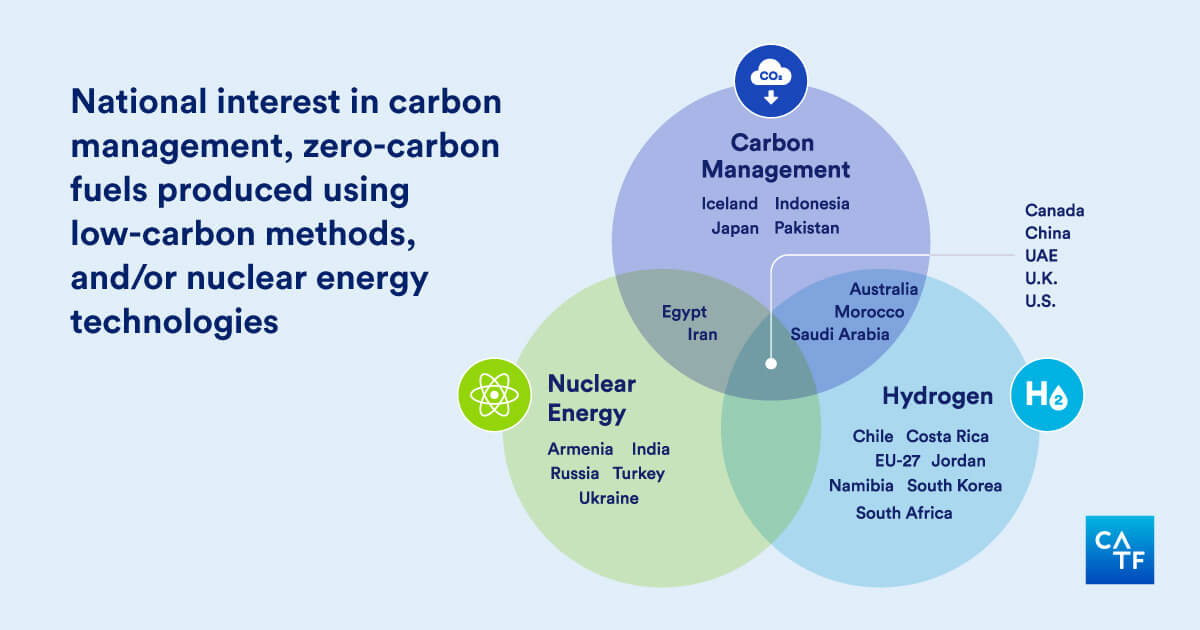Stacey Davis
CATF analysis finds both developed and developing countries plan to use advanced low-emission energy and climate technologies to meet climate goals
Reaching net-zero emissions climate goals will require unprecedented changes in how we produce and use energy around the world. Part of the solution will require increased deployment of already-commercial technologies like solar and wind energy, but a good amount of the effort needed to reach deep decarbonization will involve commercializing and scaling up additional advanced energy technologies so they can be deployed globally in time to achieve net-zero emissions goals. The IEA’s Net Zero Roadmap for the global energy sector highlights the finding that, in 2050, “almost half of the reductions will come from technologies that are currently at the demonstration or prototype phase.” This includes carbon capture and storage, advanced nuclear energy, and zero-carbon fuels such as hydrogen and ammonia produced using low-carbon methods.
Realizing long-term climate targets requires action in the near-term to enable technology diffusion. Much of the early-stage research, development and deployment of advanced energy and climate technologies is taking place in the United States and other advanced economies. An important next step is to strengthen the global agenda on using these advanced technologies. IEA’s Roadmap says that achieving the net-zero emissions goal “will require greater international cooperation among countries, notably to ensure that developing economies have the financing and technologies they need to reach net-zero in time.” Advancing early-stage projects in developing countries will offer important lessons for effectively scaling up low-carbon solutions in different contexts.
To develop international collaborations that can lead to technology diffusion, we must first find out which countries intend to use advanced low-emission energy and climate technologies to meet their climate goals. These countries may be interested in joining international partnerships to accelerate research and deployment and/or in receiving financial, technological and capacity support for early-stage projects. Nationally Determined Contributions (NDCs) are good initial source documents for this assessment, as most offer a strong indication of the types of measures that will be used to reach 2030 goals on the path to longer-term targets. For developing countries, including a particular mitigation solution in an NDC signals interest in project development to multilateral development banks, climate funds, bilateral donors and private investors.
That’s why, in its recent report, NDC Assessment: How Do Advanced Low-Emission Energy and Climate Technologies Factor into Nationally Determined Contributions, Clean Air Task Force assessed 42 NDCs, developing an initial indication of national priorities and plans to make use of three broad types of advanced low-emission energy and climate technologies:
- Carbon Management, which includes carbon capture, utilization, and storage and direct air capture climate technologies;
- Zero-Carbon Fuels (hydrogen and ammonia) produced using low-carbon methods; and
- Nuclear Energy, including Advanced Nuclear Energy.

We found strong interest in nearly every region of the world to deploy and prove out advanced low-emission energy and carbon management technologies in different contexts and for different applications. Many countries already have well-developed plans to advance these solutions and may already have projects underway. Others are at the starting block, with NDCs indicating that international support is required to study or make use of the technologies. This information could already be used to inform technology collaboration, feasibility studies, or other support that could lead to future investments.
Donor governments and institutions should take notice of the full set of countries seeking to make use of advanced low-emission energy and carbon management technologies and deliver the financial, technological, and capacity support needed to overcome barriers to deployment. In parallel, efforts to nurture a broader set of partners to advance climate technology research, development and deployment could accelerate the climate innovations needed to realize the collective Paris Agreement climate goals.
[ad_2]
Originally Appeared Here